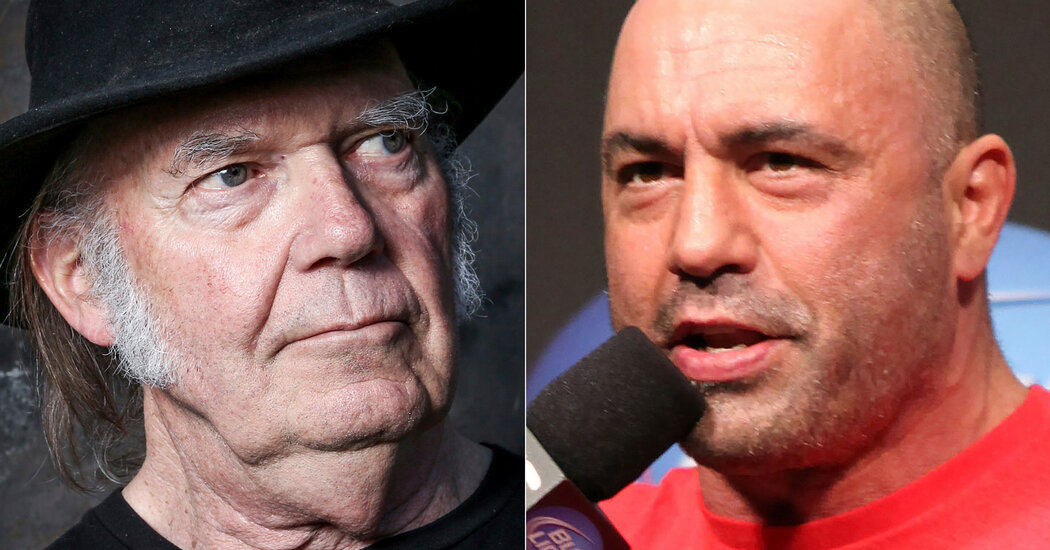Neil Young wasn’t bluffing.
Spotify confirmed on Wednesday that it has begun removing Young’s music from the streaming service, two days after the star briefly posted a public letter calling on Spotify to choose between him and Joe Rogan, the star podcast host who has been accused of spreading misinformation about the coronavirus and vaccines.
Young’s challenge to Spotify has become a high-profile, if unexpected, flashpoint in the battle over misinformation and free speech online. It also raised questions about the power of performing artists to control where their work is heard.
In a second statement that was posted to his website on Wednesday, Young called Spotify “the home of life threatening Covid misinformation.” He added: “Lies being sold for money.”
His criticism of Rogan — a comedian and actor who has become Spotify’s most popular podcast host, sometimes speaking at great length with controversial figures — came after a group of hundreds of scientists, professors and public health experts asked Spotify to take down an episode of Rogan’s show from Dec. 31. That episode, featuring Dr. Robert Malone, an infectious-disease expert, promoted “several falsehoods about Covid-19 vaccines,” according to the group’s public letter, issued on Jan. 10.
In a statement on Wednesday, Spotify said: “We want all the world’s music and audio content to be available to Spotify users. With that comes great responsibility in balancing both safety for listeners and freedom for creators. We have detailed content policies in place and we’ve removed over 20,000 podcast episodes related to Covid since the start of the pandemic.”
“We regret Neil’s decision to remove his music from Spotify,” the service added, “but hope to welcome him back soon.”
Young’s most popular songs, like “Heart of Gold,” “Harvest Moon” and “Old Man,” have been radio staples for decades, and have attracted hundreds of millions of streams on Spotify. In his statement on Wednesday, Young said that Spotify represented 60 percent of the streams of his music around the world.
Young’s music was expected to be fully removed from Spotify within hours. The news that the service was removing his songs was first reported by The Wall Street Journal.
In his original letter, which Young had addressed to his label, Warner Records, and his manager, he said: “Spotify has a responsibility to mitigate the spread of misinformation on its platform. I want you to let Spotify know immediately TODAY that I want all my music off their platform.”
He added: “They can have Rogan or Young. Not both.”
That letter was removed from Young’s website soon after it was posted, though it drew wide news media attention.
The Coronavirus Pandemic: Key Things to Know
Omicron in retreat. Though the U.S. is still facing overwhelmed hospitals and more than 2,000 deaths a day, encouraging signs are emerging as new cases start to fall nationally. The World Health Organization said that, between natural immunity through infection and vaccination, the variant offered “plausible hope for stabilization.”
Rogan, a comedian and actor, signed an exclusive podcast deal with Spotify in 2020 that has been reported to be worth $100 million, though Spotify has not confirmed that figure. His show is the most popular on Spotify.
Spotify has defended Rogan in the past, including after an episode that featured the conspiracy theorist Alex Jones in 2020.
“We want creators to create,” Daniel Ek, the chief executive and co-founder of Spotify, told The Financial Times then. “It’s what they do best. We’re not looking to play a role in what they should say.”
Spotify has 318 million monthly listeners around the world, including 172 million who pay for subscriptions, according to the company’s most recent financial disclosures.
In the past, Young has removed his music from streaming services, only to quietly reinstate it. In 2015, after making complaints about the quality of sound on streaming, he took his music down from all major audio streaming services, including Spotify and its biggest rival, Apple Music. But it was added back soon after.
Jenny Gross contributed reporting.


























